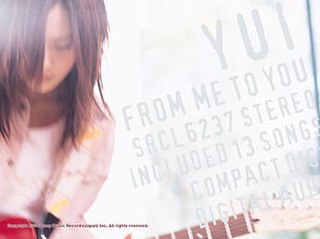
Hikaru Utada, also known mononymously as Utada, is a Japanese and American singer, songwriter, and producer. She is considered to be one of the most influential and best-selling musical artists in Japan.

Chihiro Onitsuka is a Japanese singer-songwriter.

Crystal Kay Williams is a Japanese singer, songwriter, actress and radio host.
Ai Otsuka is a Japanese singer-songwriter from Suminoe-ku, Osaka, Japan. She is a popular artist on the Avex Trax label and is best known for her 2003 hit "Sakuranbo", which stayed in the Top 200 Oricon Weekly Singles Chart for 103 weeks.

Ami Suzuki is a Japanese recording artist, DJ, and actress from Zama, Kanagawa, Japan. Having been discovered at the talent TV show Asayan, she was one of the most popular female teen idols in the late 1990s. However, in 2000, Suzuki faced legal problems with her management company resulting in a controversial blacklisting from the entertainment industry. Suzuki attempted to resurrect her career under her own steam with two indie singles before signing to Avex Trax in 2005. She released "Delightful", a dance song that reached No. 3 on the Japanese Oricon charts with a style similar to electronic club music, significantly different from her pop idol days. Since her appearance in the 2006 film Rainbow Song, Suzuki has gradually made a name for herself in the acting field, starring in various movies, television series, and musicals.

Yui Yoshioka, known mononymously as Yui, is a Japanese singer-songwriter and multi-instrumentalist. In her solo career, she sold more than 5 million physical copies in Japan. She is popular in Japan and in surrounding countries, ranking number one in 2011 Count Down TV "Dearest Female Artist" and Music Station "Artist You Most Want to Marry" polls, as well as Radio Television Hong Kong's "Most Popular Japanese Artist".

From Me to You is the debut album by Japanese singer and songwriter Yui. It was released on February 22, 2006, by Sony Music Japan. The album title is derived from the Beatles's 1963 song "From Me to You." From Me to You is primarily a pop rock record with elements of folk rock and blues rock. Lyrically, it explores themes of love, frustration, and relationships.
Mitsuyo Nemoto is a Japanese singer and actress, better known by her stage name Mie. She is a member of the popular 1970s idol group Pink Lady, known in the United States for their self-titled TV program. Mie is represented by her own management firm MHO Artist Co., Ltd.

"Put ‘Em Up" is the 24th single by Japanese singer Namie Amuro. It was released on digital and physical formats by Avex Trax on July 16, 2003, and serves as Amuro's third single from her sixth studio album Style (2003). It was originally written by Jasper Cameron and producer Dallas Austin, but portions of it were rewritten by Japanese songwriter Michico because Amuro felt the demo version was too harsh.

Up to You is the debut studio album released by Japanese pop singer Michi under Sony Music Entertainment. It was released on 30 September 2009 and peaked at number 4 on the Oricon weekly album chart. It includes the song "Something Missing", which was used in promotion for the PlayStation 3/Xbox 360 game Bayonetta.
Jasmine, is a Japanese singer and songwriter from Tokyo. She is represented by Sony Music Japan, and is a DJ for the Japanese radio station J-Wave. In June 2009 she released her debut single "Sad to Say". Described as "the next Hikaru Utada", Jasmine cites Utada as her influence.

Therapy is the second major label studio album released by British-Japanese musician MiChi, to be released on 21 March 2012 by Sony Music Entertainment. The record features just six previously unheard songs, after the remaining seven were released to the public as tracks on the various singles and EPs released in the lead up to the album's release. The album continues MiChi's tradition of including another addition to the "MadNesS Vol." series, with this being the third entrant, after the two previous released on Michi Madness and Up to You.

Unlocked is the second studio album by the Japanese singer, model and actress Meisa Kuroki. It was released on February 15, 2012 in 3 different editions: 2 limited CD+DVD editions and a Regular edition. Limited editions comes with a 40-pages photobook.

Best of 4Minute is the first Japanese compilation album by the South Korean girl group 4Minute. It is composed of all the Japanese tracks released by the group since their debut in Japan. It was released on September 26, 2012 in three different editions: 2 limited CD+DVD and a Regular edition.

1 is the Japanese debut studio album by the South Korean boy band B1A4. It was released on October 24, 2012 in three different editions.

Pain Killer is the fourth studio album by Japanese pop duo moumoon. It was released on January 30, 2013 in 4 different editions.

Lesson 1 is the debut studio album of the Japanese super girl group E-girls. It was released on April 17, 2013 in two different editions.

Koi ni Ochiru Toki is the first Japanese studio album by the South Korean boy band Infinite. It was released on June 5, 2013, in two different editions. The album is the first audio-related release of the group under Universal Music Japan's sublabel Universal D.
Natsuyo Ishinoda, is a Japanese singer-songwriter from Kōzu-shima in the Izu Islands in Tokyo. She released her debut album Himawari in 1999. Her 2009 single "Haru Sora" is her most successful single, reaching number 39 on Oricon's singles charts.

"Last Words" is a song written and recorded by Japanese-American singer-songwriter Ai. It was released on January 29, 2003, as her first single under Def Jam Japan. The song served as the lead single for her second studio album, Original Ai.
















